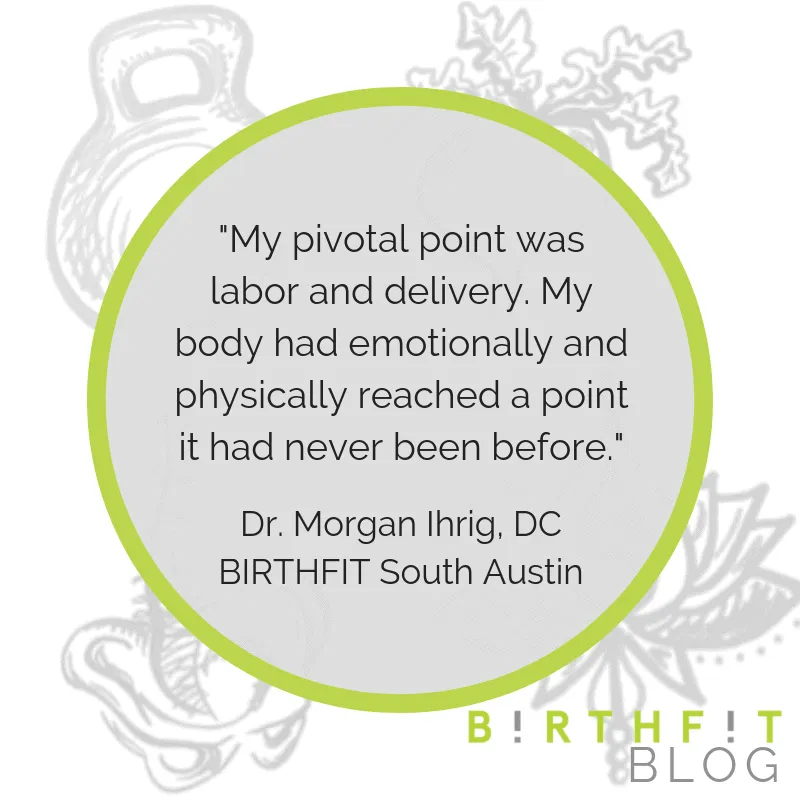Have you ever experienced a numbing, tingling, or throbbing sensation in your thumb or first three fingers of your hand while pregnant or postpartum?
Have you had trouble performing fine motor skills such as gripping objects or buttoning a shirt?
Does it feel like your hand has fallen asleep or has that pins and needles feeling for no apparent reason?
If you’ve experienced any of these symptoms, let’s make an appointment with your healthcare provider; you may have Carpal Tunnel Syndrome.
Carpal Tunnel Syndrome (CTS) occurs when the median nerve, which starts in the neck, runs down the arm, and into the wrist, is compressed or pinched as it passes through a narrow space of the wrist called the carpal tunnel.
CTS can appear any time in pregnancy but usually begins or worsens in the second trimester, when we start to retain more fluid. Experts aren’t exactly sure what causes CTS during pregnancy, but it may be linked to hormone-related swelling. While pregnant, our blood volume increases as much as 50% in order to supply our baby, uterus, and placenta. This drastic increase in blood volume may account for the swelling and extra fluid that compresses the median nerve and causes those painful symptoms. Other reasons for CTS include repetitive motions or activities to the wrist, like sewing, knitting, excessive writing, typing, or carrying heavy loads.
Will I have CTS Forever?!
If you are pregnant or postpartum, you may be wondering if you’ll have Carpal Tunnel Syndrome for the rest of your life. Many women experience CTS during pregnancy and well into their postpartum season. After delivery, symptoms of CTS usually go away gradually without treatment as the swelling from pregnancy subsides. However, they can last longer if you’re breastfeeding due to wrist position during feeding. If symptoms persist after your baby is born or they become more severe (meaning you have constant numbness, muscle weakness, or loss of sensation), be sure to mention it to your healthcare provider during your next postpartum visit; you may be referred to a specialist or surgeon.
Relief for Carpal Tunnel Syndrome During Pregnancy & Postpartum
The following are some recommendations to decrease wrist symptoms usually associated with CTS:
What to Do On Your Own for Carpal Tunnel Syndrome
- Rest and SLOW DOWN – Reduce activities that cause movement or pain in the wrist. Whenever you feel pain in your wrist or hand, we suggest you rest or switch to a completely different activity that does not involve the hand or wrist, and slow down.
- Warm Water Immersion – In warm water, gently flex your hand and wrist. Try this exercise 3-4 times per day.
- Cold Therapy – Try wrapping your wrist in an ice sleeve (or ice wrapped in a towel) for 10-15 minutes, several times a day.
- Contrast Bath – You can also try a contrast bath where you soak your wrist in warm water for 2-3 minutes, then cold water for the same amount of time. Contrast baths are a form of hydrotherapy that have been shown to help decrease pain and increase circulation through the use of hot and cold water immersion.
- Elevation – Keeping your arm slightly elevated above the heart while resting or sleeping will help prevent the build up of excess fluid in the wrists. Elevate your wrists whenever possible using pillows to keep them propped up
- Yoga – Although there is not much data to back it up, mamas agree that yoga has helped reduce pain and increase grip strength. The reason may be associated more towards increased breathing, blood and oxygen flow, meditation and reduced stress levels.
- A Wrist Splint – A wrist splint keeps your wrist from bending and keeps your hand properly aligned. You may also wear it when you sleep to avoid flexing or overextending your wrist.
- Speak up! – Ask your employer if you can switch jobs for a while and/or simply reduce the amount of typing you do. If you don’t speak up for yourself, you may continue to experience unnecessary suffering with symptoms of CTS.
Help from Others for Carpal Tunnel Syndrome
- Chiropractic – In addition to ensuring that the spine and nervous system are functioning properly, adjustments to the extremities and soft tissue mobilization can be beneficial.
- Physical Therapy – Finding a professional therapist to help properly and safely move everything from your shoulders, arms, and wrists is key to improving hand function, mobility, circulation, and reducing fluid build-up, swelling and pain.
- Myofascial Release Therapy – MFR is a type of alternative therapy involving massage and gentle sustained pressure into the myofascial connective tissues. It is used to treat skeletal muscle immobility, relax muscles, relieve pain, restore motion, and improve blood and lymphatic circulation. It has been shown to greatly reduce CTS-related pain and increase hand function.
- The Graston Technique (GT) Therapy – is another form of manual massage. GT and instruments enable the treatment of scar tissue and fascial restrictions during rehabilitation that allows for faster rehabilitation and with greater success when the goal is restoring range of motion, eliminating pain, and restoring normal function (1). GT combined with manual massage administered by the clinicians hands have been found to be beneficial in alleviating symptoms of Carpal Tunnel. Studies reveal that localized relaxation massage combined with multimodal care [at least two distinct therapeutic modalities] may provide short-term benefit for treating carpal tunnel syndrome (2,)(3).
- Non-Steroidal Anti-Inflammatory Drug (NSAID) – Although pain relievers such as acetaminophen, Ibuprofen or naproxen are common and may cause temporary pain relief, they could have some serious side effects in your pregnancy. We suggest you consult with your primary care provider before taking any and all medications.
- Ultrasound Therapy – According to a 2013 study, ultrasound therapy for CTS “involves applying a round-headed instrument to the skin of the painful area, to deliver sound waves that are absorbed by the underlying tissues, to help relieve pain and lessen disability (4).” To some moms, this form of therapy has proven to be painless, effective and refreshing.
Surgical and Non-surgical Interventions for Carpal Tunnel Syndrome
- Steroid Injection – Serves as a temporary fix for CTS. According to new research from doctors at Hassleholm Hospital in Sweden (in the Sept. 3 issue of the journal Annals of Internal Medicine), 3 out of 4 patients who received the injection needed surgery within a year (5).
- Surgery – In moderate to severe cases, Carpal Tunnel Release surgery is required. This surgery involves opening up the carpal tunnel to relieve pressure on the median nerve. The surgery does not guarantee that CTS will not return, especially if mom returns to doing the activity that may have contributed to CTS in the first place and/or if mom becomes pregnant again.
If you are experiencing pain or discomfort during your pregnancy or postpartum due to Carpal Tunnel Syndrome, try one of the methods above for relief. Whichever method you choose, we always recommend incorporating some form of rest, which is why it’s first on our list. After all, we could all use a little more rest in our very busy lives. Do you have a method or remedy that works best for you? We would love to know!
References
- The Graston Technique Therapy. Retrieved on January 16, 2019 from https://www.grastontechnique.com/Patients.
- Burke J, et al. A pilot study comparing two manual therapy interventions for carpal tunnel syndrome. DOI: 10.1016/j.jmpt.2006.11.014. 2007 Jan;30(1):50-61.
- Piper S, et al. The effectiveness of soft-tissue therapy for the management of musculoskeletal disorders and injuries of the upper and lower extremities: A systematic review by the Ontario Protocol for Traffic Injury management (OPTIMa) collaboration.
2016 Feb; 21:18-34. doi: 10.1016/j.math.2015.08.011. Epub 2015 Aug 29. - Page, MJ, et al. Therapeutic ultrasound for carpal tunnel syndrome. Cochrane Database of
Systematic Reviews 2013, Issue 3. Art. No.: CD009601. DOI:
10.1002/14651858.CD009601.pub2 - Atroshi, et al. Steroid Injections for the Carpal Tunnel Syndrome. Annals of Internal Medicine.
Ann Intern Med. ;159:I–18. Doi: 10.7326/0003-4819-159-5-201309030-00001.
September 3, 2013. Accessed December 18, 2018.

